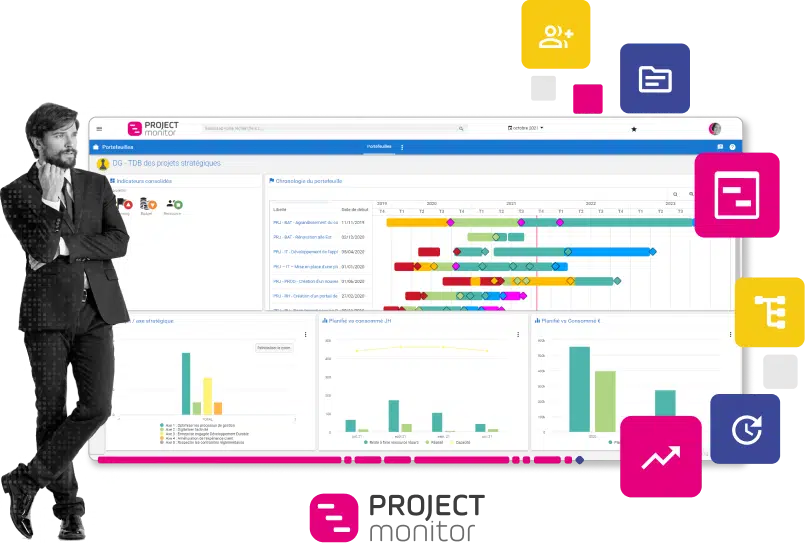Why is project planning important?
Are you experiencing difficulties in completing your projects on schedule? Are your costs spiraling out of control?
If these problems sound familiar, it's likely that your planning process needs improvement.
Indeed, planning is a crucial step that can determine whether a project will be a success or doomed to failure.
To help you improve your project planning process, discover in this article :
- what project planning is,
- the benefits of good planning for your organization.
What is project planning?
Planning is an important step, if not the most important step, in project management. It involves clearly defining objectives, and identifying the steps needed to achieve them. It also involves forecasting the necessary resources, establishing a realisticschedule , and allowing for unforeseen circumstances.
Planning ensures that project quality, costs and deadlines are respected .
To find out more about project planning, read our full article on the subject.
What are the key stages in project planning?
The second stage in the project life cycle, planning, comprises a series of steps to be carried out successively or in parallel.
These key steps are :
- Define project objectives, scope and deliverables.
- Draw up a list of actions to be carried out.
- Prioritize and order these actions.
- Estimate the duration of each action and draw up a schedule.
- Allocate the necessary resources (human, financial and material).
- Identify risks and develop plans to manage them.
- Determine monitoring indicators to measure project progress.
What are the benefits of project planning?
Project planning is crucial to the success of an initiative, ensuring optimum management of costs, deadlines and quality. It enables you to estimate the resources required, establish a realistic schedule and define the performance standards expected. Without proper planning, a project is exposed to financial risks, delays and poor quality.
There are several substantial benefits associated with project planning:
- Increased chances of success: Careful planning considerably increases the likelihood of project success, by clarifying objectives, milestones and resource requirements. It also facilitates progress monitoring and early detection of potential problems, thus reducing the risk of failure.
- Risk reduction: Thorough planning enables risks to be identified and managed proactively. This helps prevent delays, budget overruns and other problems that may arise during project execution.
- Improved communication: Planning defines a common frame of reference for all project stakeholders. This harmonization fosters communication and coordination within the team, which are essential to the project's success.
- Optimizing resources: Effective planning enables resources to be allocated wisely, helping to avoid waste and maximize operational efficiency.
- Quality control: Planning usually includes specific quality standards. By establishing them from the outset, it ensures that the quality of the final product is in line with expectations.
If you want your projects to succeed, it's essential to take the time to plan them carefully. By following the steps outlined above, you can increase your chances of success.
💡A to remember
Lack of planning is undoubtedly one of the major causes of project failure. It exposes the project to risks such as budget overruns, delays and quality problems, all of which can jeopardize its success. This is why the use of Portfolio Management software such as Project Monitor is essential to ensure the success of your initiatives.
Project Monitor offers a range of powerful tools to help you draw up detailed plans, track progress at every stage and achieve your goals efficiently. Thanks to its advanced features, this software enables you to :
- Develop solid plans: Project Monitor helps you to develop solid project plans by enabling you to clearly define objectives, actions, necessary resources, deadlines and budgets. This ensures that each project is carefully planned, taking into account the constraints of the entire project portfolio.
- Monitor progress in real time: The software offers real-time monitoring of project progress, enabling you to quickly detect deviations from the initial plan and take corrective action.
- Manage resources efficiently: Project Monitor helps you allocate resources optimally, ensuring that each employee is assigned to the right projects, helping to maximize productivity.
- Analyze data and performance: the software provides detailed analyses and reports on project performance, enabling you to make informed decisions.
By using Project Monitor, you can overcome the challenges of project planning and increase your chances of successfully completing your initiatives. Remember, rigorous planning is the cornerstone of success, and Project Monitor is the tool you need to support you in this process.
Other useful questions about project planning
Why is project planning important?
What elements should be included in project planning?
What are the tools for operational planning?
What are the stages in project planning?
What are the 4 dimensions of project planning?
What is project planning?
How is project planning carried out?
Who is responsible for project planning?
Project Monitorproject portfolio management software
All the tools you need to plan and manage project portfolios. All in one software package.
Discover the features of Project Monitor, PPM software tailored to the needs of PMOs, CIOstructures with more than 50 employees or managing complex projects.
Easily manage over 100 active projects and pilot your action plans. Get a complete overview of what's going on in your project portfolios: resources, schedulebudget, dashboards.
